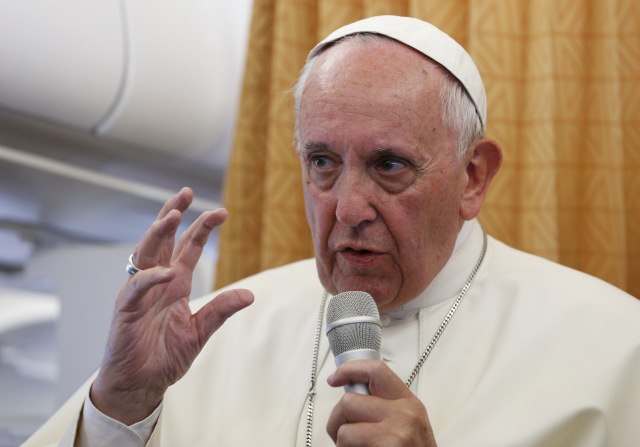-

-
Pope Francis spoke on the Armenian genocide, the relation of the Church to homosexuals, and Britain’s vote last week to leave the European Union, as well as a host of other topics in a wide-ranging press conference on his flight back to Rome following his Apostolic Voyage to Armenia.Sunday’s in-flight press conference began with questions about the Apostolic Voyage to Armenia that Pope Francis had just concluded. Asked about his message for Armenia for the future, the Holy Father spoke about his hopes and prayers for justice and peace, and his encouragement that leaders are working to that end. In particular, he talked of the work of reconciliation with Turkey and with Azerbaijan. The Pope will be travelling to Azerbaijani later this year.Pope Francis also spoke about his use of the word ‘genocide,’ acknowledging the legal import of the expression, but explaining that this was the term commonly in use in Argentina for the massacre of Armenians during the first World War.During the press conference, Pope Francis also addressed a number of religious and ecumenical issues. Speaking about the controversy that arose from remarks by the Prefect of the Pontifical Household, Archbishop Georg Ganswein, who in a speech earlier this month had spoken of a shared “Petrine ministry,” Pope Francis insisted there was only one Pope, while praising the pope emeritus as a “great man of God.”About the Pan-Orthodox Council, which concluded Sunday in Crete, the Pope said, “A step was made forward . . . I think the result was positive.” In response to a question about upcoming commemorations of the 500th anniversary of the Protestant “Reformation,” Pope Francis said, “I think perhaps this is also the right moment for us not only to remember the wounds on both sides, but also to recognize the gifts of the Reformation.” He also had words of praise for Martin Luther. The Pope praying and working together are important for fostering unity.Pope Francis also answered a question about women deacons, and his decision to form a commission to study the issue. He said he was surprised and annoyed to hear that his remarks were interpreted to mean that the Church had opened the door to deaconesses. “This is not telling the truth of things,” he said. But, he continued, “women’s thought is important,” because they approach questions differently from men. “One cannot make a good decision without listening to women.Reporters also questioned the Pope about recent events, including the recent “Brexit” vote in Britain. He said he had not had time to study the reasons for the British vote to leave the European Union, but noted that the vote showed “divisions,” which could also be seen in other countries. “Fraternity is better, and bridges are better than walls,” he said, but he acknowledged that there are “different ways of unity.” Creativity and fruitfulness are two key words for the European Union as it faces new challenges.The secular press, meanwhile, latched onto remarks Pope Francis made concerning the Church’s relationship to homosexuals. Insisting once again that homosexuals must not be discriminated against, the Pope said that the Church should apologize to homosexuals and ask forgiveness for offending them – but he added, the Church should also ask forgiveness of any groups of persons who had been hurt by Christians who do not live up to the Gospel. There will always be good and bad Christians in the Church, he said, citing Christ’s parable of the wheat and the weeds. “All of us are saints, because all of us have the Holy Spirit. But we are all sinners, [and] I [am] the first.”Finally, answering a question from Father Federico Lombardi, SJ, the Director of the Holy See Press Office, Pope Francis reflected on his visit to the Memorial at Tzitzernakaberd, and his upcoming journey to Poland, which will include a visit to Auschwitz. The Pope said that in such places, he likes to reflect silently, “alone,” praying that the Lord might grant him “the grace of crying.”At the conclusion of the press conference, Pope Francis thanked the reporters for their hard work and goodness.Source: Vatican Radio





